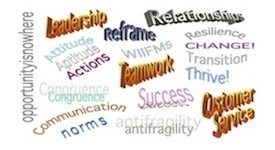Programs to help you improve your:
* Attitudes, Aptitudes & Actions in your job,
* Teamwork, Cust. Service & Leadership,
* Ability to positively influence others.

|
For leaders and meeting planners who need a powerful keynote speaker |
|
Programs to help you improve your: * Attitudes, Aptitudes & Actions in your job, |

|
| Presentations | Video/Song Demos | Clients & Comments |
Articles, Books & CDs |
F.A.Q.s | About Kim | Contact Kim |
Live&WorkWiseMarch 2014, from Kim Ratz, Speaker-Trainer-Troubadour A Thought to Help You Live&WorkWise: An Airplane Just Disappeared?! With today's sophisticated technology, this isn't supposed to happen. We are accustomed to getting quick answers and solutions, so the dissapearance of 239 passengers aboard Malaysian Air flight 370 for almost 3 weeks now is not only troubling -- it's scary. Even if the plane is found, the answers to "Why & How?" may never be known. It reminds us we are vulnerable, that some things are beyond control, and you just never know when something terrible or unexplainable might happen to you or someone you know! Plus, this event will probably prompt more changes in the way we fly, and some will likely be expensive and inconvenient ... This mystery is the most recent example why I'm including the research being conducted by economist Nasiim Nicholas Taleb ("Learning to Love Volativity") in my seminars. Taleb cites the increasing occurance of what he calls "black swans" - isolated events that are unexpected and highly consequential (think "Enron," "9-11," "Katrina & Sandy," etc.) He suggests these "black swans" will continue to happen, so we need to learn how to be "antifragile," i.e., less fragile and more resilient to be able to navigate these situations when the unknown predominates, and suggests 5 strategies to increase the "antifragility" of economic systems:
I believe his findings yield clues that can also help both individuals and non-economic type organizations too. Seminar participants have told me they really value these practical discussions about Taleb's premise and strategies to be less fragile and more resilient. So in this article I share my take for how to adapt his "antifragility" strategies for your personal and professional use, and encourage you to consider what you can do to increase your "antifragility" so you not only get through these events - you can even come out better in some way! Rule 1: Think of the economy as a cat, not a washing machine. My take: Using the "brittle bone" metaphor above, you need to exercise your "antifragility" skills so when "black swans" happen you and your team are resilient, strong and capable of responding when pushed ... Organizations and systems are made up of people, who are organic and complex, and who by nature want to survive and "make things better" ... Your go-getters will bring your group to "push" things and meet resistance, which keeps attitudes and skills sharper, i.e., stronger. Capitalize on that and let people find ways to help themselves and each other get better, and most people will do it! Rule 2: Small is beautiful, but it is also efficient. My take: I remember when schools tried "bigger is better" by creating huge school campuses that could offer more classes and require less administration ... It wasn't long before we saw that individual student needs were being bypassed or buried in the bulk ... We adapted by creating "communities of learners" that would sub-group within the larger campus to try to compensate some attention, and now the research and designs are gearing back to smaller school size, smaller class size, and more individualized instruction ... Decentralization almost always makes sense, especially if the focus of the service/program is to serve people, by interacting with people to solve problems that affect individuals, families and communities ... If your system requires you to link several decentralized locations, then figure it out so the right people share the right information in the right ways at the right times, and don't let the need for logistics keep you from doing what you need to do ... Remember the "KISS Principle": "Keep it Simple Sweetie." Rule 3: Trial & Error beats academic knowledge. My take: I don't think this has to be an "Either/Or" - I think it can be an "And"; we need both academics and seat-of-the-pants innovators. While it's true that not everyone needs to go to a typical 4 year college to succeed, it's a lot less likely for someone to succeed who doesn't graduate from high school and have some post-secondary training ... A strong public education system is vital to our society's future success in every sense - economically, as well as public health and safety, improved living standards in our communities, continued innovation and inventions, etc. I also know there are many "Albert Einsteins," working right now in their garages and basements on inventions/innovations that will soon be part of our everyday lives, like a new way to generate power, or a new way to communicate, or a new way to fight a disease, or a new way to do something better or make it easier ... Rule 4: Decision makers must have skin in the game. Rule 5: Favor businesses that benefit from their own mistakes not those whose mistakes percolate into the system. My take: No matter what type of work you do, or what life role or goal you pursue, if you don't learn from your mistakes and figure out different and "better" ideas, you just aren't going to succeed as much as you otherwise could! And increasingly, if you don't keep finding ways to continuously improve and keep up, or growing into other areas that keep you "lean & mean" - you'll find yourself falling behind ... Quotes related to "Antifragility & Resilience" for the days ahead ... When we walk to the edge of all the light we have and take the step into the darkness of the unknown, we must believe that one of two things will happen. There will be something solid for us to stand on, or we will be taught to fly. - Patrick Overton |
| Presentations | Video/Song Demos | Clients & Comments | Articles & Products | F.A.Q.s | About Kim | Contact Kim |
|
SUBSCRIBE to my free blog: "Live & Work Wise" Just send me an email (kimratz@aol.com) and add "subscribe" in the subject line, and every 2 months or so I'll send you this free, fast, & fun read to inspire hope, improve skills to cope, and induce a chuckle along the way, featuring content I share in my presentations. |
|
|
Since 2006 Kim has been proud to sponsor:  "July is National Make a Difference to Children Month" "July is National Make a Difference to Children Month"Click HERE for more info ... |
|
Kim learned how to create & maintain this web site through an on-line course at: www.ed2go.com. |